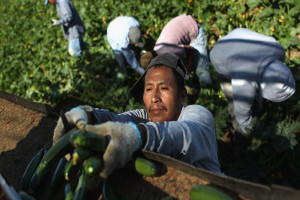By Alessandra Profumo
Click in this article to find out more about the song and the story behind it.
Deportee (also known as «Plane Wreck at Los Gatos»)
The crops are all in and the peaches are rott’ning,
The oranges piled in their creosote dumps;
They’re flying ‘em back to the Mexican border
To pay all their money to wade back again
Goodbye to my Juan, goodbye, Rosalita,
Adios mis amigos, Jesus y Maria;
You won’t have your names when you ride the big airplane,
All they will call you will be «deportees»
My father’s own father, he waded that river,
They took all the money he made in his life;
My brothers and sisters come working the fruit trees,
And they rode the truck till they took down and died.
Some of us are illegal, and some are not wanted,
Our work contract’s out and we have to move on;
Six hundred miles to that Mexican border,
They chase us like outlaws, like rustlers, like thieves.
We died in your hills, we died in your deserts,
We died in your valleys and died on your plains.
We died ‘neath your trees and we died in your bushes,
Both sides of the river, we died just the same.
The sky plane caught fire over Los Gatos Canyon,
A fireball of lightning, and shook all our hills,
Who are all these friends, all scattered like dry leaves?
The radio says, «They are just deportees»
Is this the best way we can grow our big orchards?
Is this the best way we can grow our good fruit?
To fall like dry leaves to rot on my topsoil
And be called by no name except «deportees»?
On January 28, 1948, an airplane carrying thirty-two people crashed in Los Gatos Canyon, California. The four American crew members and twenty-eight migrant farm workers being deported to Mexico, were killed. News accounts on the radio that day, and in the newspapers on the days that followed, listed the names of the crew members but referred to the twenty-eight passengers as “deportees”. The bodies of the twenty-seven men and one woman, recovered in that crash in the Diablo Mountains, were buried in a mass grave in the Holy Cross Cemetery in Fresno. Only twelve of the victims were ever identified.
According to all accounts, famed American folk singer, Woody Guthrie, was deeply struck by the fact that none of the media reports at the time, named any of the Mexican victims or even bothered to look into their identities. He first recorded his reactions as sort of a poem with simple guitar strumming. It would be ten years later that that poem would be set to music by school teacher, Martin Hoffman, and recorded by revered folk singer, Pete Seeger. It was Seeger’s version that became most popular though more than thirty-five versions by various artists have been since performed and recorded.
So why in 2013 should this simple song about a tragic accident in 1948 still have relevancy? As we wait to hear the fate of the Immigration Reform Act now facing passage in the House, new provisions continue to be added that may strengthen the bill politically but weaken the existing compromise initiative. Provisions such as, though qualified applicants on the path to citizenship will now be expected to pay taxes, they will not qualify for health care benefits, may make the bill an easier pill for those on the far right to swallow. They will however, do nothing to ease the discomfort of an ailing child of a hard working farmhand, who won’t be able to afford to send his child to a doctor. His child still will be underserved only now, openly and legally. The lyrics of the song remain relevant as the debate over illegal migrant farm workers rages on, farmers are still being subsidized not to grow food, and poor people still don’t have enough to eat. But I digress.
This Guthrie song is still relevant as long as we, as a society, continue to dehumanize each other with epithets such as “illegal alines”, “terrorists”, “welfare mothers”, “gringos”, and oh yes, “deportees”. It is so much easier to deny health care to an illegal alien than to someone named Carlos Gomez. It is also easier for some to immediately assume that a person named Carlos Gomez, rather than a Carl Smith, is an illegal alien. Nonetheless, it is our name that, for good or bad, contributes to who we are and how the rest of the world views us. I once knew the daughter of a Chinese immigrant who changed the family name from Khan to Cohen thinking that the family would escape any negative connotation associated with Genghis, only to be met with anti-Semitism.
Our names are what connect us to our history, our culture. While researching about the Guthrie song, I came across a recent NPR interview with author Tim Hernandez who, in doing his own research on a book he is writing, has unlocked the mystery of the names of those workers who died sixty-five years ago. There is now a project to properly memorialize the workers by creating a marker listing their names. Hernandez, along with Lance Canales, both sons of migrant farm workers, have collaborated on an updated version of the song that includes the reading of those names.
This dehumanizing of groups of people makes it easy to demonize them. Both sides of the political spectrum are guilty of this. Yet, today if another air disaster such as this were to take place, it is still more than likely that the victims would be reported as being unnamed deportees. I doubt that we will ever hear of a Cessna going down with just a bunch of unnamed one per-centers.









Thank you for this Alessandra Profumo
Still shocking
A sad reminder of why this topic continues to be relevant, and why the laws need to change to benefit those its benefiting from.
so injustice……